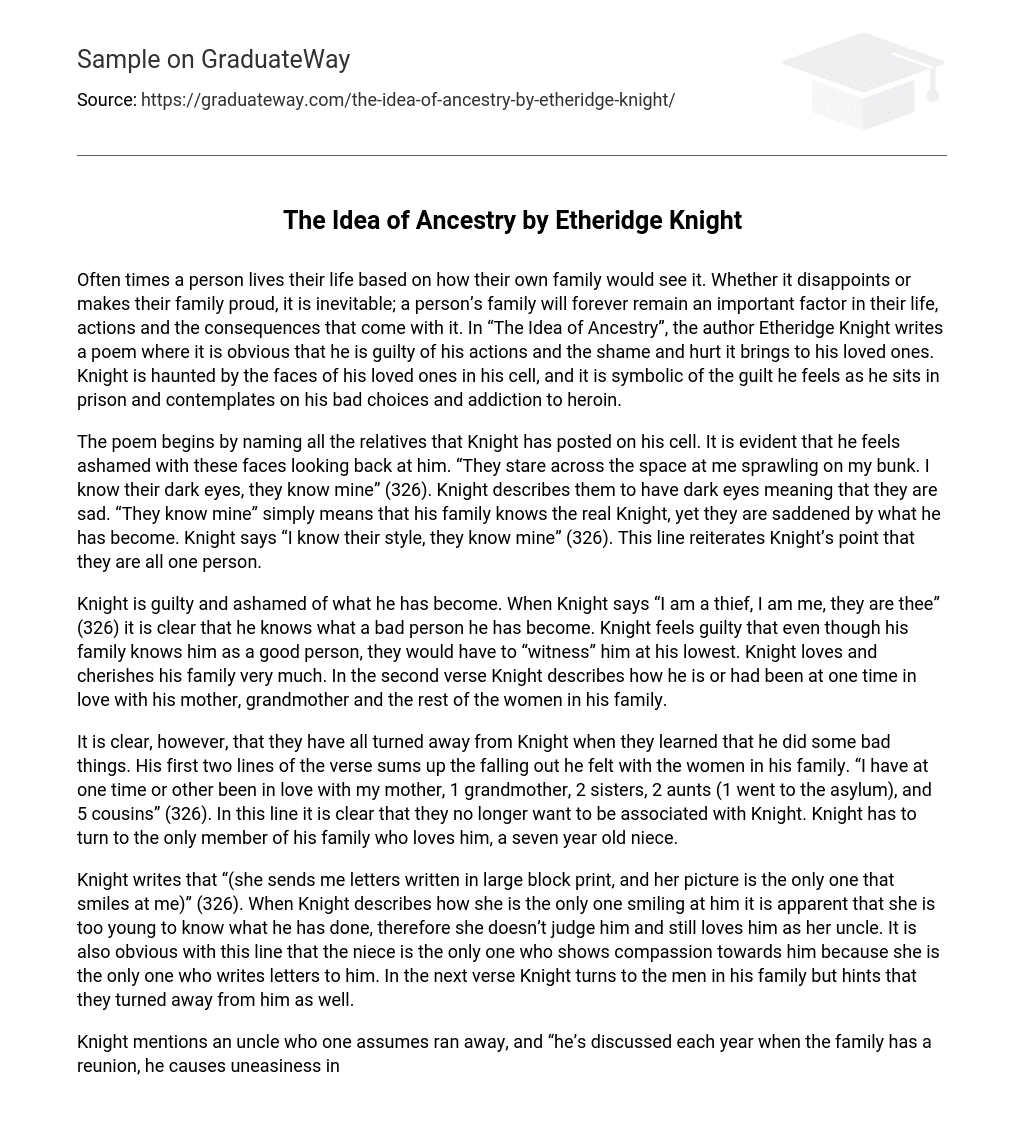Often times a person lives their life based on how their own family would see it. Whether it disappoints or makes their family proud, it is inevitable; a person’s family will forever remain an important factor in their life, actions and the consequences that come with it. In “The Idea of Ancestry”, the author Etheridge Knight writes a poem where it is obvious that he is guilty of his actions and the shame and hurt it brings to his loved ones. Knight is haunted by the faces of his loved ones in his cell, and it is symbolic of the guilt he feels as he sits in prison and contemplates on his bad choices and addiction to heroin.
The poem begins by naming all the relatives that Knight has posted on his cell. It is evident that he feels ashamed with these faces looking back at him. “They stare across the space at me sprawling on my bunk. I know their dark eyes, they know mine” (326). Knight describes them to have dark eyes meaning that they are sad. “They know mine” simply means that his family knows the real Knight, yet they are saddened by what he has become. Knight says “I know their style, they know mine” (326). This line reiterates Knight’s point that they are all one person.
Knight is guilty and ashamed of what he has become. When Knight says “I am a thief, I am me, they are thee” (326) it is clear that he knows what a bad person he has become. Knight feels guilty that even though his family knows him as a good person, they would have to “witness” him at his lowest. Knight loves and cherishes his family very much. In the second verse Knight describes how he is or had been at one time in love with his mother, grandmother and the rest of the women in his family.
It is clear, however, that they have all turned away from Knight when they learned that he did some bad things. His first two lines of the verse sums up the falling out he felt with the women in his family. “I have at one time or other been in love with my mother, 1 grandmother, 2 sisters, 2 aunts (1 went to the asylum), and 5 cousins” (326). In this line it is clear that they no longer want to be associated with Knight. Knight has to turn to the only member of his family who loves him, a seven year old niece.
Knight writes that “(she sends me letters written in large block print, and her picture is the only one that smiles at me)” (326). When Knight describes how she is the only one smiling at him it is apparent that she is too young to know what he has done, therefore she doesn’t judge him and still loves him as her uncle. It is also obvious with this line that the niece is the only one who shows compassion towards him because she is the only one who writes letters to him. In the next verse Knight turns to the men in his family but hints that they turned away from him as well.
Knight mentions an uncle who one assumes ran away, and “he’s discussed each year when the family has a reunion, he causes uneasiness in the clan, he is an empty space” (327). Similar to the women, Knight feels that the men are also saddened by his actions. Knight confirms this by saying that the uncle that ran away is not in the Family Bible. Knight’s grandmother keeps a bible with everyone’s birth and death dates but the uncle is not included, for “there is no place in her Bible for whereabouts unknown” (327).
Even though Knight knows that he let his family down by his actions, he still tries to make up for it by trying to connect with his estranged family. In the third verse Knight mentions “a salmon quitting the cold ocean-leaping and bucking up his birthstream” meaning that even though he went against his family’s wishes he still goes back to where he came from. “I had a ball till the caps ran out and my habit came down” (327); he had a good time in his family’s hometown, but his heroin addiction was so bad that he had to leave Louisiana to Memphis just to get a fix for his drugs.
It is sad that he looked at his grandmother and split because the addiction was so strong that he couldn’t resist but to leave and find more of the drugs. The poem “The Idea of Ancestry” is about Etheridge Knight’s family and how they seem to view his addiction. In the last verse Knight writes “there is a gray stone wall damming my stream”; this reiterates the idea that the family disapproves of his drug addiction. Even though Knight is trying to live his life how he wants to he can’t help but feel guilty that his family does not consent of any of his hooligan actions.
Works Cited
- Knight, Etheridge. “The Idea of Ancestry.” Portable Legacies: Fiction, Poetry, Drama, Nonfiction. By Lynne Crockett and Jan Zlotnik. Schmidt. Boston, MA: Wadsworth Cengage Learning, 2009. 326-27. Print.





